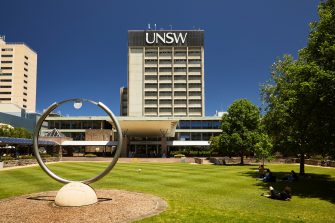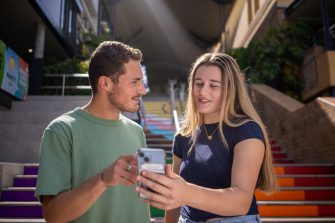Consent explained

Content Warning: Conversations about consent, sexual harassment and sexual assault can be challenging, but you don’t need to face it alone. Find the support you need with someone who is trained to help, through free and confidential support services and 1800RESPECT: 1800 737 732.
Creating a culture of respect at UNSW
Consent matters, each and every time. Everyone, no matter who they are, or where they come from, has the right to be respected and have autonomy over their bodies. That’s why UNSW is committed to creating a safe and respectful environment for everybody.
Whether you're a student or staff member at UNSW, we all have a part to play in keeping our community safe. Upholding and observing the standards of equity and respect when interacting with every member of our community is vital to creating a culture where consent and communication are an integral part of everyday life. We're all responsible for ensuring that every member of the community is treated with the respect they deserve.
Affirmative consent
Consent is when a person freely and voluntarily agrees to behaviour, understanding what they are doing and who they are doing it with. This includes situations in everyday life and when it comes to sexual activity. The FRIES acronym can be a helpful way to check-in for consent.
Following the recent reforms in sexual consent laws, affirmative consent is a legal requirement in NSW as of 1 June 2022. Affirmative consent means that consent can’t be assumed, and a person must do or say something to affirm that they have consent at the time, and for the duration, of sexual activity.
Consent is reversible, and anyone can change their mind about what they want to experience at any time.
Consent is informed and involves ongoing and mutual communication.
You must actively seek and affirm enthusiastic consent through words or action, as consent cannot be assumed from silence or inactivity.
Consent is specific, meaning that consenting to one sexual activity (e.g., kissing), does not mean you are consenting to others (e.g., oral sex). Consent matters and needs to be affirmed every time. Just because you consented to having sex once, doesn’t mean you automatically consent to sex in the future.
FRIES is a concept by Planned Parenthood What Is Sexual Consent? | Facts About Rape & Sexual Assault (plannedparenthood.org)
Check-in for consent every time
Remember, consent is an ongoing conversation. That means you should check-in for consent every time and #MakeNoDoubt. If you're ever unsure about boundaries or how to start the conversation, see the NSW Governments Make No Doubt campaign, which provides examples of how to check-in for consent.
Consent Conversations with Chanel Contos
Four UNSW students had the opportunity to discuss consent with Chanel Contos, founder of “Teach Us Consent” and author of “Consent Laid Bare”.
You can watch the full discussion or choose bits that interest you from the short excerpts below.
Content context: This discussion talks about consent, perpetrators of sexual violence, and sexual assault. If you would like to get some support after watching, you can talk to someone who is trained to help.
UNSW students: Connect with on campus support.
Understanding consent
-
View on YouTube
-
View on YouTube
-
View on YouTube
-
View on YouTube
-
View on YouTube
-
View on YouTube
-
View on YouTube
-
View on YouTube
Supporting people
-
View on YouTube
-
View on YouTube
-
View on YouTube
More
-
View on YouTube
-
View on YouTube
-
View on YouTube
Lack of consent
The 2021 UA National Student Safety Survey report found that gendered violence (including sexual harassment, sexual assault and unwelcome sexual behaviour) is still far too prevalent across Australian Universities. Gendered violence is against the UNSW Codes of Conduct and Values and has no place at UNSW.
What is sexual assault?
When engaging in sexual activity, there must always be affirmative consent, where there is ongoing communication and boundaries are respected. Engaging in sexual activity without consent is a crime.
Sexual assault is a crime.
If someone says they’ll use a condom and then deliberately removes it during sex without their partner’s consent, that may be sexual assault.
A person can’t consent if they are:
- asleep or unconscious
- significantly affected by drugs or alcohol
- intimidated, coerced or threatened
- tricked about the identity of the other person involved
- submitting because the other person is abusing a position of trust, power or authority
- unable to understand what they are consenting to
- under the age of consent (16 years)
Be an active bystander
If you witness disrespectful behaviour or an incident of gendered violence at UNSW, be an active bystander. An active bystander witnesses an incident and takes action to disrupt the situation and prevent it from escalating, if it is safe to do so. Be aware of high-risk situations and always consider your own safety first. Active bystanders challenge disrespectful behaviours and attitudes, and play an important role in creating a culture of respect that prevents incidents from occurring in the first place.
Access support and make a report
If you, or someone you know, is affected by gendered violence, there are options available for you to receive support and make a report. Your report can be anonymous, and you can make a report on behalf of someone else. To find out what happens after you make a report, please see this booklet.
Learn more about consent
Be A Better Human Booklet – consent, sexual harassment and sexual assault
SEXtember – resources including a free online course and videos on consent
Students: Review ELISE Respect@UNSW resources




